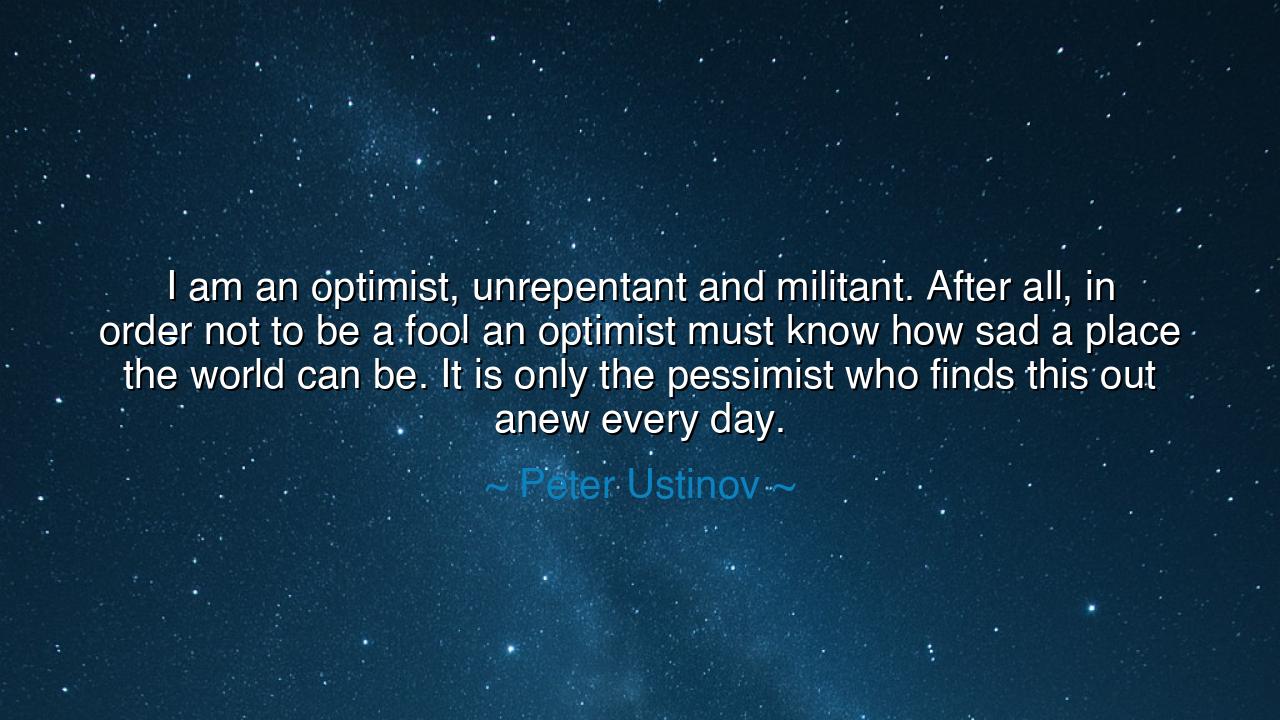
I am an optimist, unrepentant and militant. After all, in order
I am an optimist, unrepentant and militant. After all, in order not to be a fool an optimist must know how sad a place the world can be. It is only the pessimist who finds this out anew every day.






There are those who walk through the shadows of the world with a light that does not falter. Peter Ustinov, in his profound reflection, said, “I am an optimist, unrepentant and militant. After all, in order not to be a fool an optimist must know how sad a place the world can be. It is only the pessimist who finds this out anew every day.” In these words, he lays bare a truth as ancient as the philosophers themselves: optimism is not naivety, but courage informed by reality. To be an optimist is to see the darkness and yet walk forward, to confront despair without being conquered by it, and to act as if hope is both necessary and possible.
Ustinov’s declaration carries a subtle rebuke to those who mistake optimism for foolishness. The optimist, he says, is aware of the world’s sadness—of war, injustice, and suffering—and yet refuses to surrender. In contrast, the pessimist lives in constant astonishment at life’s cruelty, seeing tragedy as something new each day. Ustinov frames optimism not as a blind posture, but as a conscious defiance, a militant refusal to accept despair as inevitable. In this way, optimism becomes a weapon against the heaviness of existence, a shield for the soul, and a light that others can follow.
Throughout history, there have been figures who embodied this resilient optimism. Consider Nelson Mandela, imprisoned for twenty-seven years under the weight of injustice and cruelty, yet emerging with a vision of reconciliation. Mandela did not ignore the sadness of the world; he saw it in its deepest, darkest forms. But he chose to act with hope, to believe that a divided nation could be healed. His optimism was neither naive nor passive—it was informed, militant, and unrepentant, a living testament to Ustinov’s principle.
Ustinov’s insight also touches upon the wisdom of experience. The true optimist does not need to discover the world’s sorrow anew each day; she has already seen it, weighed it, and chosen to move forward anyway. Like the Stoic philosophers of old, who taught that one must prepare for misfortune yet cultivate joy, the optimist recognizes suffering but refuses to let it dictate her spirit. In doing so, she gains clarity and power, knowing that hope is not a luxury, but a choice born of understanding.
There is also a subtle, almost poetic justice in Ustinov’s words: the pessimist is perpetually surprised by sadness, as if life continually violates expectation. The optimist, however, carries sadness as a familiar companion, transforming it into wisdom and compassion. In this, optimism is not passive cheer—it is active engagement with reality, the courage to acknowledge pain while working toward light. It is a philosophy that honors both the darkness and the possibility of dawn.
Consider the story of Anne Frank, whose diary became a beacon of hope amid unimaginable horror. She knew well the cruelty and sorrow of the world, yet she wrote, “In spite of everything, I still believe that people are really good at heart.” Anne’s optimism was not ignorance; it was a defiant choice, an act of inner militancy against despair. Her words continue to inspire because she exemplified Ustinov’s truth: to be an optimist is to see the sadness of the world fully, and still believe in the human spirit.
From this, we can draw a vital lesson: to live wisely is to cultivate an informed optimism. One must not close one’s eyes to suffering, nor deny the presence of injustice. Rather, one must meet these truths head-on, and still choose hope, action, and belief in better possibilities. To do otherwise is to surrender to the relentless astonishment of pessimism, and to be immobilized by the sadness that is already known to those who see clearly.
And so, let us heed Peter Ustinov’s counsel: walk through life aware of its pain, yet unafraid to carry light. Be optimistic, unrepentant, and militant, not in denial of suffering, but in embrace of purpose. For it is in the courageous choice to hope amidst sorrow that the soul finds its strength, the world its renewal, and the heart its enduring song of life.






AAdministratorAdministrator
Welcome, honored guests. Please leave a comment, we will respond soon